Dongruo Zhou
Risk Bounds of Accelerated SGD for Overparameterized Linear Regression
Nov 23, 2023Abstract:Accelerated stochastic gradient descent (ASGD) is a workhorse in deep learning and often achieves better generalization performance than SGD. However, existing optimization theory can only explain the faster convergence of ASGD, but cannot explain its better generalization. In this paper, we study the generalization of ASGD for overparameterized linear regression, which is possibly the simplest setting of learning with overparameterization. We establish an instance-dependent excess risk bound for ASGD within each eigen-subspace of the data covariance matrix. Our analysis shows that (i) ASGD outperforms SGD in the subspace of small eigenvalues, exhibiting a faster rate of exponential decay for bias error, while in the subspace of large eigenvalues, its bias error decays slower than SGD; and (ii) the variance error of ASGD is always larger than that of SGD. Our result suggests that ASGD can outperform SGD when the difference between the initialization and the true weight vector is mostly confined to the subspace of small eigenvalues. Additionally, when our analysis is specialized to linear regression in the strongly convex setting, it yields a tighter bound for bias error than the best-known result.
Variance-Dependent Regret Bounds for Linear Bandits and Reinforcement Learning: Adaptivity and Computational Efficiency
Feb 21, 2023Abstract:Recently, several studies (Zhou et al., 2021a; Zhang et al., 2021b; Kim et al., 2021; Zhou and Gu, 2022) have provided variance-dependent regret bounds for linear contextual bandits, which interpolates the regret for the worst-case regime and the deterministic reward regime. However, these algorithms are either computationally intractable or unable to handle unknown variance of the noise. In this paper, we present a novel solution to this open problem by proposing the first computationally efficient algorithm for linear bandits with heteroscedastic noise. Our algorithm is adaptive to the unknown variance of noise and achieves an $\tilde{O}(d \sqrt{\sum_{k = 1}^K \sigma_k^2} + d)$ regret, where $\sigma_k^2$ is the variance of the noise at the round $k$, $d$ is the dimension of the contexts and $K$ is the total number of rounds. Our results are based on an adaptive variance-aware confidence set enabled by a new Freedman-type concentration inequality for self-normalized martingales and a multi-layer structure to stratify the context vectors into different layers with different uniform upper bounds on the uncertainty. Furthermore, our approach can be extended to linear mixture Markov decision processes (MDPs) in reinforcement learning. We propose a variance-adaptive algorithm for linear mixture MDPs, which achieves a problem-dependent horizon-free regret bound that can gracefully reduce to a nearly constant regret for deterministic MDPs. Unlike existing nearly minimax optimal algorithms for linear mixture MDPs, our algorithm does not require explicit variance estimation of the transitional probabilities or the use of high-order moment estimators to attain horizon-free regret. We believe the techniques developed in this paper can have independent value for general online decision making problems.
Nearly Minimax Optimal Reinforcement Learning for Linear Markov Decision Processes
Dec 12, 2022Abstract:We study reinforcement learning (RL) with linear function approximation. For episodic time-inhomogeneous linear Markov decision processes (linear MDPs) whose transition dynamic can be parameterized as a linear function of a given feature mapping, we propose the first computationally efficient algorithm that achieves the nearly minimax optimal regret $\tilde O(d\sqrt{H^3K})$, where $d$ is the dimension of the feature mapping, $H$ is the planning horizon, and $K$ is the number of episodes. Our algorithm is based on a weighted linear regression scheme with a carefully designed weight, which depends on a new variance estimator that (1) directly estimates the variance of the \emph{optimal} value function, (2) monotonically decreases with respect to the number of episodes to ensure a better estimation accuracy, and (3) uses a rare-switching policy to update the value function estimator to control the complexity of the estimated value function class. Our work provides a complete answer to optimal RL with linear MDPs, and the developed algorithm and theoretical tools may be of independent interest.
Learning Two-Player Mixture Markov Games: Kernel Function Approximation and Correlated Equilibrium
Aug 10, 2022Abstract:We consider learning Nash equilibria in two-player zero-sum Markov Games with nonlinear function approximation, where the action-value function is approximated by a function in a Reproducing Kernel Hilbert Space (RKHS). The key challenge is how to do exploration in the high-dimensional function space. We propose a novel online learning algorithm to find a Nash equilibrium by minimizing the duality gap. At the core of our algorithms are upper and lower confidence bounds that are derived based on the principle of optimism in the face of uncertainty. We prove that our algorithm is able to attain an $O(\sqrt{T})$ regret with polynomial computational complexity, under very mild assumptions on the reward function and the underlying dynamic of the Markov Games. We also propose several extensions of our algorithm, including an algorithm with Bernstein-type bonus that can achieve a tighter regret bound, and another algorithm for model misspecification that can be applied to neural function approximation.
Computationally Efficient Horizon-Free Reinforcement Learning for Linear Mixture MDPs
May 23, 2022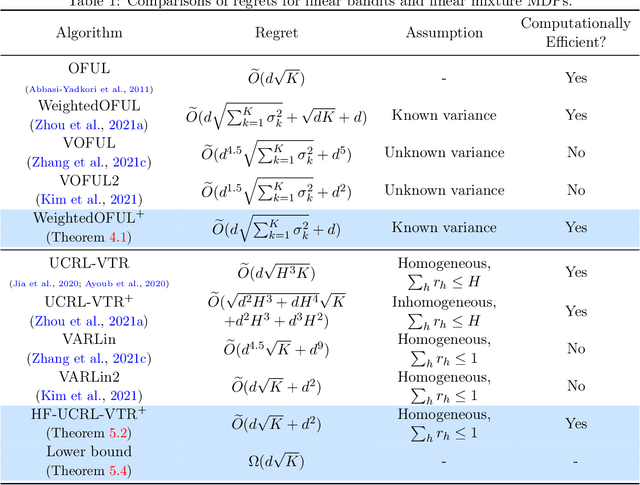
Abstract:Recent studies have shown that episodic reinforcement learning (RL) is not more difficult than contextual bandits, even with a long planning horizon and unknown state transitions. However, these results are limited to either tabular Markov decision processes (MDPs) or computationally inefficient algorithms for linear mixture MDPs. In this paper, we propose the first computationally efficient horizon-free algorithm for linear mixture MDPs, which achieves the optimal $\tilde O(d\sqrt{K} +d^2)$ regret up to logarithmic factors. Our algorithm adapts a weighted least square estimator for the unknown transitional dynamic, where the weight is both \emph{variance-aware} and \emph{uncertainty-aware}. When applying our weighted least square estimator to heterogeneous linear bandits, we can obtain an $\tilde O(d\sqrt{\sum_{k=1}^K \sigma_k^2} +d)$ regret in the first $K$ rounds, where $d$ is the dimension of the context and $\sigma_k^2$ is the variance of the reward in the $k$-th round. This also improves upon the best-known algorithms in this setting when $\sigma_k^2$'s are known.
Nearly Optimal Algorithms for Linear Contextual Bandits with Adversarial Corruptions
May 13, 2022
Abstract:We study the linear contextual bandit problem in the presence of adversarial corruption, where the reward at each round is corrupted by an adversary, and the corruption level (i.e., the sum of corruption magnitudes over the horizon) is $C\geq 0$. The best-known algorithms in this setting are limited in that they either are computationally inefficient or require a strong assumption on the corruption, or their regret is at least $C$ times worse than the regret without corruption. In this paper, to overcome these limitations, we propose a new algorithm based on the principle of optimism in the face of uncertainty. At the core of our algorithm is a weighted ridge regression where the weight of each chosen action depends on its confidence up to some threshold. We show that for both known $C$ and unknown $C$ cases, our algorithm with proper choice of hyperparameter achieves a regret that nearly matches the lower bounds. Thus, our algorithm is nearly optimal up to logarithmic factors for both cases. Notably, our algorithm achieves the near-optimal regret for both corrupted and uncorrupted cases ($C=0$) simultaneously.
Bandit Learning with General Function Classes: Heteroscedastic Noise and Variance-dependent Regret Bounds
Feb 28, 2022
Abstract:We consider learning a stochastic bandit model, where the reward function belongs to a general class of uniformly bounded functions, and the additive noise can be heteroscedastic. Our model captures contextual linear bandits and generalized linear bandits as special cases. While previous works (Kirschner and Krause, 2018; Zhou et al., 2021) based on weighted ridge regression can deal with linear bandits with heteroscedastic noise, they are not directly applicable to our general model due to the curse of nonlinearity. In order to tackle this problem, we propose a multi-level learning framework for the general bandit model. The core idea of our framework is to partition the observed data into different levels according to the variance of their respective reward and perform online learning at each level collaboratively. Under our framework, we first design an algorithm that constructs the variance-aware confidence set based on empirical risk minimization and prove a variance-dependent regret bound. For generalized linear bandits, we further propose an algorithm based on follow-the-regularized-leader (FTRL) subroutine and online-to-confidence-set conversion, which can achieve a tighter variance-dependent regret under certain conditions.
Learning Contextual Bandits Through Perturbed Rewards
Jan 24, 2022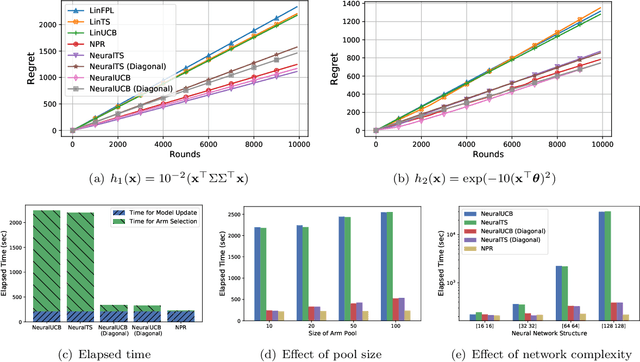


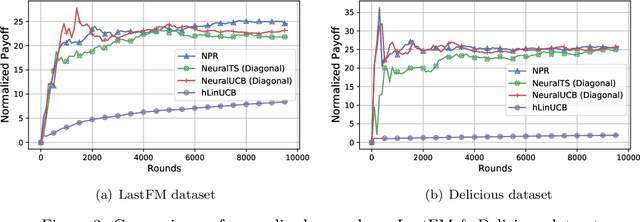
Abstract:Thanks to the power of representation learning, neural contextual bandit algorithms demonstrate remarkable performance improvement against their classical counterparts. But because their exploration has to be performed in the entire neural network parameter space to obtain nearly optimal regret, the resulting computational cost is prohibitively high. We perturb the rewards when updating the neural network to eliminate the need of explicit exploration and the corresponding computational overhead. We prove that a $\tilde{O}(\tilde{d}\sqrt{T})$ regret upper bound is still achievable under standard regularity conditions, where $T$ is the number of rounds of interactions and $\tilde{d}$ is the effective dimension of a neural tangent kernel matrix. Extensive comparisons with several benchmark contextual bandit algorithms, including two recent neural contextual bandit models, demonstrate the effectiveness and computational efficiency of our proposed neural bandit algorithm.
Faster Perturbed Stochastic Gradient Methods for Finding Local Minima
Oct 25, 2021
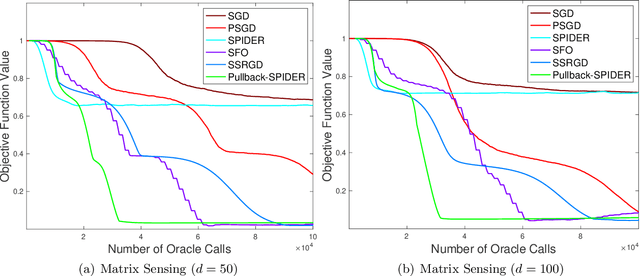
Abstract:Escaping from saddle points and finding local minima is a central problem in nonconvex optimization. Perturbed gradient methods are perhaps the simplest approach for this problem. However, to find $(\epsilon, \sqrt{\epsilon})$-approximate local minima, the existing best stochastic gradient complexity for this type of algorithms is $\tilde O(\epsilon^{-3.5})$, which is not optimal. In this paper, we propose \texttt{Pullback}, a faster perturbed stochastic gradient framework for finding local minima. We show that Pullback with stochastic gradient estimators such as SARAH/SPIDER and STORM can find $(\epsilon, \epsilon_{H})$-approximate local minima within $\tilde O(\epsilon^{-3} + \epsilon_{H}^{-6})$ stochastic gradient evaluations (or $\tilde O(\epsilon^{-3})$ when $\epsilon_H = \sqrt{\epsilon}$). The core idea of our framework is a step-size ``pullback'' scheme to control the average movement of the iterates, which leads to faster convergence to the local minima. Experiments on matrix factorization problems corroborate our theory.
Linear Contextual Bandits with Adversarial Corruptions
Oct 25, 2021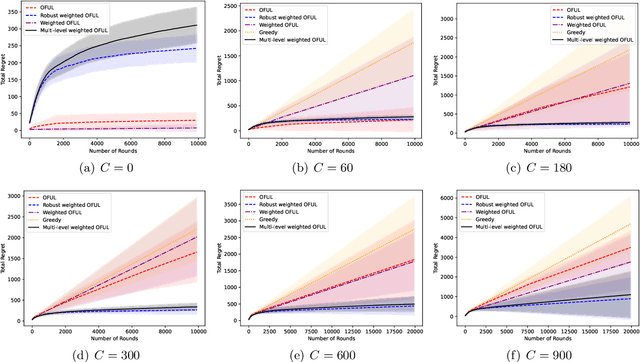
Abstract:We study the linear contextual bandit problem in the presence of adversarial corruption, where the interaction between the player and a possibly infinite decision set is contaminated by an adversary that can corrupt the reward up to a corruption level $C$ measured by the sum of the largest alteration on rewards in each round. We present a variance-aware algorithm that is adaptive to the level of adversarial contamination $C$. The key algorithmic design includes (1) a multi-level partition scheme of the observed data, (2) a cascade of confidence sets that are adaptive to the level of the corruption, and (3) a variance-aware confidence set construction that can take advantage of low-variance reward. We further prove that the regret of the proposed algorithm is $\tilde{O}(C^2d\sqrt{\sum_{t = 1}^T \sigma_t^2} + C^2R\sqrt{dT})$, where $d$ is the dimension of context vectors, $T$ is the number of rounds, $R$ is the range of noise and $\sigma_t^2,t=1\ldots,T$ are the variances of instantaneous reward. We also prove a gap-dependent regret bound for the proposed algorithm, which is instance-dependent and thus leads to better performance on good practical instances. To the best of our knowledge, this is the first variance-aware corruption-robust algorithm for contextual bandits. Experiments on synthetic data corroborate our theory.
 Add to Chrome
Add to Chrome Add to Firefox
Add to Firefox Add to Edge
Add to Edge